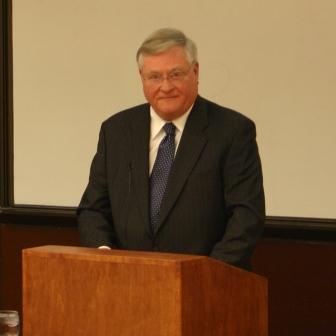Judge H. Robert Mayer '71 Presents 2008-09 Mervis Lecture

The creation of the Federal Circuit was treated with suspicion by many in light of the failure in the early 1900s of the U.S. Commerce Court, another court of limited subject matter jurisdiction. Judge Mayer quoted Judge Henry Friendly, who served on the U.S. Court of Appeals for the Second Circuit from 1959 to 1986, in calling the Commerce Court the "Banquo's ghost (of Macbeth fame) in any discussion thereafter about federal courts of specialized jurisdiction." But while the Federal Circuit may likewise be characterized as an experiment, Judge Mayer said, "experiments by definition are not permanent. Either they fail or they succeed . . . . The Court of Appeals for the Federal Circuit is an experiment that has succeeded."
President Ronald Reagan appointed Judge Mayer, a 1971 graduate of the Law School, to the Federal Circuit in 1987; Judge Mayer served as Chief Judge of the court from 1997 to 2004. Judge Mayer credited the success of the court to its broad jurisdiction and the varied backgrounds of the judges appointed to the bench. "The broader the jurisdiction the court has, the better," he noted. "It reduces the chances that the court will succumb to parochialism, insularity, and idiosyncratic rulings." Indeed, of all the cases before the court last year, only about a third (476 of 1,321 appeals) involved intellectual property issues. "The Federal Circuit is not so much a specialized court, given its wide reach of subject matter, as it is a special court," he said. Like the U.S. Army Airborne Rangers, in which Judge Mayer once served, the court has "developed deeper expertise for special missions, but [is] equally an integral part of the larger institution."
The Stanley H. Mervis Lectureship in Intellectual Property was created in memory of Stanley Mervis in 2003 by his family and friends. Mervis, a member of the William & Mary Law School Class of 1950, was patent counsel for Polaroid Corporation for most of his career and was actively involved in important patent and intellectual property issues.